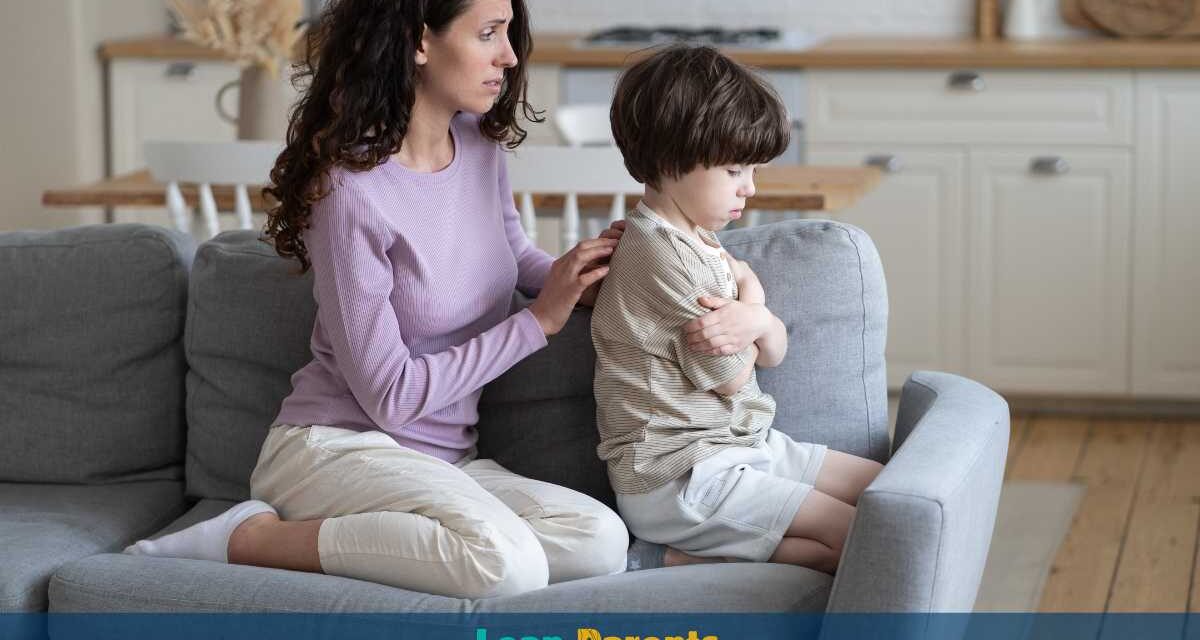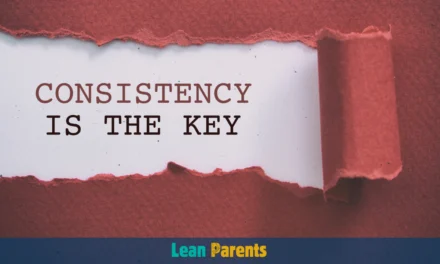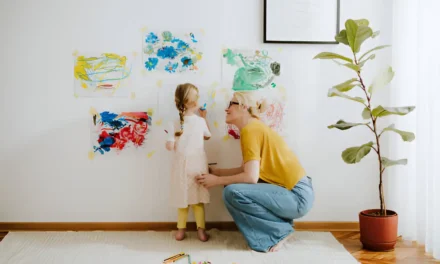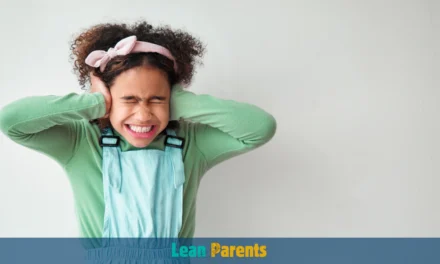As a parent, I’ve learned that apologizing to my kids is a sign of strength, not weakness. It helps build trust, teaches emotional intelligence, and strengthens family bonds1. After over a decade of parenting, I see apologizing as a chance to show accountability, empathy, and the value of making things right1. In a world that values perfection, embracing the power of parental apologies is key.
It’s hard to admit mistakes, but the benefits are worth it1. By apologizing sincerely, we teach our kids valuable life skills. These skills help them in adulthood2. Even when we make mistakes, like losing our temper, saying sorry can change everything. It builds trust, respect, and opens up communication between us and our kids2.
Key Takeaways
- Apologizing to children is a sign of strength, not weakness, and can build trust and strengthen family bonds.
- Admitting mistakes and taking responsibility models important life skills like accountability and empathy.
- Genuine apologies help repair relationships and create an environment of open communication and healing.
- Overcoming the discomfort of apologizing can lead to tremendous personal and relational growth.
- Parental apologies teach children the value of making amends and the power of forgiveness.
Understanding the Impact of Parental Apologies
Parental apologies are very good for kids. They help build trust, respect, and open communication3. When parents say sorry, they make a safe place for kids to share their feelings. This is based on Albert Bandura’s social learning theory, showing the value of example3.
The Psychological Benefits for Children
When parents say sorry, it really helps kids feel good about themselves3. If parents don’t say sorry, kids might feel scared, not good enough, or not worthy3. But saying sorry makes kids feel safe to talk and share their feelings3.
Building Trust Through Vulnerability
4 Young kids like to play with those who say sorry after hurting them4. They also like it when someone helps fix what they broke4. Parents being open and taking responsibility teaches kids to be empathetic and understand others’ feelings3.
Creating Emotional Safety in Parent-Child Relationships
When parents say sorry, it makes kids feel safe to make mistakes3. This helps kids not feel bad about themselves and trust that they are worthy3. So, kids feel free to be themselves and learn from their mistakes3.
| Effective Apologies | Ineffective Apologies |
|---|---|
By using the power of saying sorry, families can create a safe and trusting environment3. This strengthens the bond between parents and kids3.
Why Parents Struggle with Saying Sorry
Apologizing to kids can be tough for many parents. Some find it hard to admit mistakes because of parental pride5. Others never learned to apologize, making it feel strange and uncomfortable6.
Parents might feel awkward because they were never taught to admit fault as kids7. This can make it hard to say sorry and learn from mistakes7.
Some worry that saying sorry will make their kids lose respect7. But, research shows that apologizing can actually build trust. It teaches kids about empathy, honesty, and forgiveness7.
It’s important for parents to work on these challenges. By showing kids how to admit mistakes and make amends, parents can strengthen their bond. This creates a family where everyone feels comfortable talking openly7.
One parent shared that their 8-year-old expected an apology. This shows how important it is for parents to let kids learn from their mistakes5. It’s better not to rush to say sorry right away5.
It’s also key for parents to teach kids to take responsibility for their actions5. A podcast episode called “Sorry Not Sorry” talks about when to apologize and the importance of personal responsibility5.
By getting past parental pride, admitting mistakes, and emotional barriers, parents can improve their relationship with their kids. They teach valuable lessons about accountability and empathy7.
The Role of Modeling Behavior in Child Development
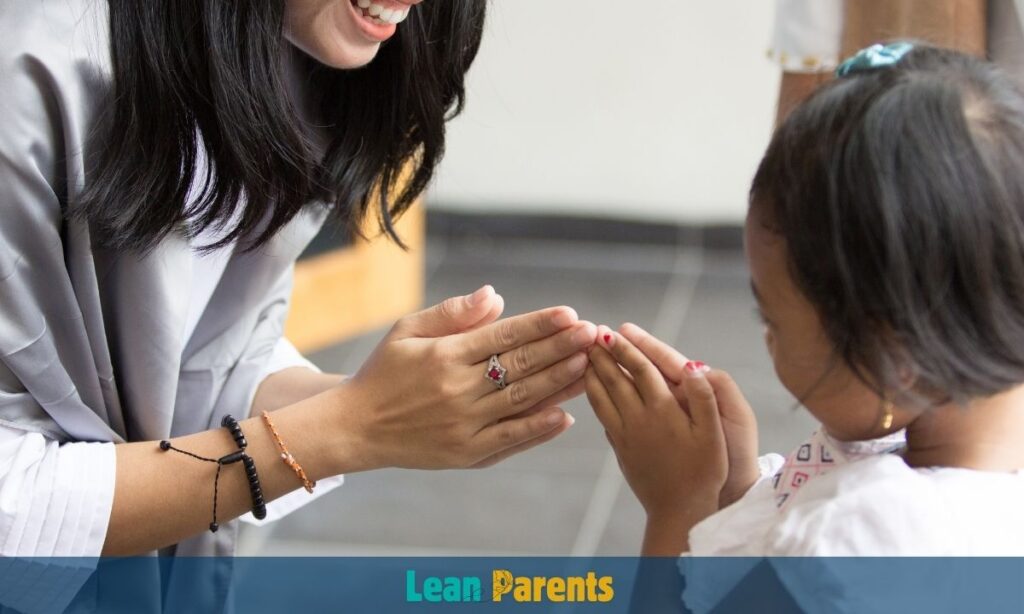
Albert Bandura’s social learning theory shows that kids learn by watching and copying others, especially their parents. When parents act in certain ways, it teaches kids that making mistakes and asking for forgiveness is okay8. This way of learning has big effects on kids’ emotional intelligence. It helps them understand others, take responsibility, and forgive8.
Social Learning Theory and Parental Influence
According to the social learning theory, kids learn by watching their parents and seeing what happens next. When parents show respect, take responsibility, and solve problems, kids learn from them9. The parental influence on a child’s growth is huge. Kids often copy what they see at home9.
Long-Term Effects on Children’s Emotional Intelligence
How parents handle their feelings and solve problems affects a child’s emotional intelligence8. By showing empathy, taking responsibility, and saying sorry, parents teach kids important skills8. But, forcing kids to say sorry without fixing the problem can make them seem fake and not really understand8.
In the end, how parents deal with their own mistakes and help their kids with conflicts shapes the next generation. By showing the behavior they want in their kids, parents can boost emotional intelligence and strengthen family ties9.
Breaking the Cycle of Perfect Parenting Expectations
It’s key to accept that no one is perfect in realistic parenting. This acceptance makes a space where both parents and kids can make mistakes without fear. Learning to handle mistakes is important and helps kids deal with their own errors10.
Many parents feel the need to have kids who are perfect in every way11. But this dream can lead to burnout and a lack of connection. By embracing imperfections, parents can make a safe space for kids to explore and learn without fear.
- Admit your own flaws as a parent. This shows kids that nobody is perfect.
- Focus on small achievements, not unattainable perfection12.
- Make sure kids feel safe to share their feelings12.
- Get help from others to deal with parenting challenges. This can help avoid neglect or abuse12.
By adopting realistic parenting, parents can create a better environment for their kids to grow101112. This not only helps kids but also brings more joy to parenting.
| Consequence | Statistic |
|---|---|
| Diabetes | 10 |
| Lung Disease | 10 |
| Malnutrition | 10 |
| Vision Problems | 10 |
| Heart Attack | 10 |
| Cancer | 10 |
| Stroke | 10 |
“Kids of abusive parents can grow up untrusting, quick to anger, and suspicious of attachment due to stored messages received during childhood from abusive parents.” – Karen Young, Child Development Educator10
Changing bad parenting habits takes effort and support. It’s about understanding yourself, finding help, and making small changes for big results10.
Apologizing to Your Kids: A Step-by-Step Guide
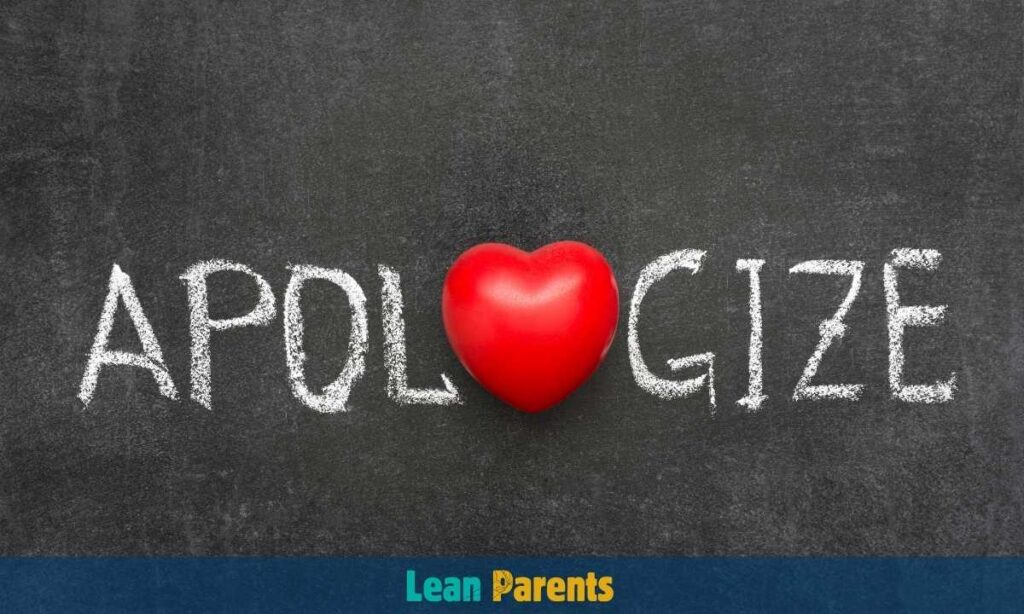
Good communication and solving conflicts are key to a strong bond with your kids. Apologizing to them right, with the right words, and following up is crucial. Experts say it’s important to show responsibility and empathy. This helps repair trust and teaches kids about being accountable and understanding emotions13.
Timing Your Apology Effectively
First, pick the right time to apologize. Wait until you and your child are calm and ready to talk14. This way, you can talk openly about what happened, say sorry, and plan to avoid it again14.
Choosing the Right Words
Be careful with your words when apologizing. Avoid using “but” or “if” because they can make your apology seem less sincere14. Clearly say you were wrong, express regret, and offer a way to fix it14. This shows your child that their feelings matter and helps improve communication14.
Following Through with Actions
After apologizing, it’s important to follow through. Show you’re serious by acting responsibly and doing what you said15. This builds trust and teaches kids about being accountable and caring15.
Learning to apologize well helps parents teach empathy and how to solve problems. A genuine apology can make your family stronger and help your kids have better relationships later15.
| Effective Apologies | Ineffective Apologies |
|---|---|
|
|
“Apologizing to your kids models responsibility and empathy, not weakness. It teaches them to recognize their own shortcomings and learn to apologize as well.” – Dr. Meghna Joshi, Child Psychiatrist14
By using these tips, parents can turn apologizing into a chance for growth and stronger family ties15. The first step is to say “I’m sorry” and then work on fixing things15.
The Difference Between Genuine and Forced Apologies
In parenting, saying “I’m sorry” is just the start. What really matters is being sincere and true. Genuine apologies show real remorse and a wish to fix things. Forced apologies, however, lack the real feeling that kids can spot.
When parents force apologies, kids might not feel sorry. This can make them less able to understand and feel emotions16. Kids who are made to apologize for things they don’t really regret might feel ashamed and powerless16. It shows they don’t trust the child to learn from their mistakes on their own16. It also misses a chance to teach them about empathy16.
But, teaching kids to apologize genuinely and talk about empathy can be very effective16. It helps them learn important life skills. It teaches them to think about others’ feelings and take responsibility for their actions16.
| Genuine Apologies | Forced Apologies |
|---|---|
|
|
The key difference is in the emotional depth and growth. By promoting real communication and honesty, parents can help their kids grow up responsible and empathetic. This builds stronger, more trusting relationships17.
“Modeling genuine apologies and engaging children in discussions about empathy and accountability can lead to a more effective approach in teaching children essential life skills.”16
Teaching Responsibility Through Personal Example
As parents, we have a special chance to shape our kids’ character. We can do this by showing personal accountability and honesty. When we own up to our mistakes and apologize truly, we teach our kids the value of personal accountability, character development, and honesty in parenting18.
Many adults find it hard to apologize sincerely18. But by showing our kids how to do it, we teach them the importance of making amends. This not only builds trust but also teaches them to own up to their actions19.
- Acknowledge the wrongdoing: Take time to think about your mistake and how it affected your child.
- Express genuine remorse: Say sorry truly, showing you regret what happened and want to fix it.
- Outline how to improve: Tell your child how you plan to avoid similar mistakes in the future.
- Allow time for healing: Let your child have space to accept your apology and rebuild trust at their own pace.
By doing this, you not only show responsible behavior but also teach that mistakes are chances to grow, not to be ashamed of18. This helps kids develop emotional intelligence and learn to handle their own mistakes with strength and awareness19.
Teaching responsibility through personal example is a strong way to help kids grow in character. When we admit our flaws and take responsibility, we encourage our kids to do the same. This sets them on a path to becoming responsible, caring, and trustworthy people1819.
Common Scenarios That Call for Parental Apologies
Parenting is a tough journey filled with moments needing empathy and courage to say sorry. Parenting mistakes, conflict resolution, and family dynamics are all part of it. Knowing when to apologize is key for a good parent-child relationship.
Losing one’s temper is a common reason for a parental apology. Parents get frustrated or angry sometimes. It’s important to say sorry when we hurt our children’s feelings or make them feel unsafe20. Apologizing shows we value emotional accountability and teach healthy ways to deal with anger.
Another time for an apology is when we unfairly accuse or assume about our children. They’re still learning and might not always meet our expectations21. By owning up to our biases and apologizing, we build trust and make our children feel understood.
- Breaking promises to our children also needs a sincere apology. They count on us to be reliable, and when we’re not, it shakes their trust21. Apologizing and making things right helps strengthen their faith in us.
- Ignoring or making light of our children’s feelings is another reason to say sorry. Their emotions are real and deserve respect21. By acknowledging their feelings, we build a stronger bond and help them learn to handle their emotions.
Being ready to apologize in these situations is a powerful way to show healthy conflict resolution and improve family dynamics. By accepting our flaws and owning up to our parenting mistakes, we create a safe space for trust, empathy, and open talks. This benefits our children’s emotional and social growth.
“Parenting is a journey, not a destination, and the willingness to apologize is a crucial part of that journey.” – Dr. Pooja Lakshmin
| Scenario | Reason for Apology | Potential Impact |
|---|---|---|
| Losing Temper | To acknowledge and take responsibility for emotional outbursts | Models healthy conflict resolution and reinforces emotional accountability |
| Making Unfair Accusations | To recognize biases and acknowledge jumping to conclusions | Builds trust and creates an environment where children feel heard and understood |
| Breaking Promises | To acknowledge and make amends for failing to follow through | Strengthens children’s trust and demonstrates the importance of honoring commitments |
| Dismissing Feelings | To validate and acknowledge the child’s emotions | Fosters a stronger emotional connection and helps children develop emotional regulation skills |
By using apologies in these common situations, parents can improve family dynamics, teach conflict resolution skills, and create a supportive environment for their children’s growth2021.
The Connection Between Apologies and Emotional Intelligence
Apologizing is key to growing emotional intelligence22. When parents say sorry to their kids, they show empathy. This helps kids learn to understand and share feelings22.
Developing Empathy
At birth, kids think the world is fair. But when things go wrong, they learn to value fairness over justice22. Apologies teach kids to see things from others’ viewpoints. They learn to take blame for their mistakes22.
This helps them deal with tough social situations better. They become more aware and caring of others’ feelings.
Understanding Emotional Consequences
Kids might feel like they’re to blame for bad actions. They think they deserve any punishment22. If parents don’t say sorry, kids get mixed up about right and wrong22.
Apologies show kids that everyone makes mistakes. It’s okay to say sorry. It shows strength, not weakness.
By showing how to apologize, parents create a safe space for mistakes22. This builds self-acceptance and self-worth. These are key to emotional intelligence22.
The link between saying sorry and emotional smarts is empathy and responsibility. Parents who apologize teach their kids to be aware and strong emotionally22.
How Apologies Strengthen Family Bonds
Apologies are key in making family relationships stronger and building emotional bonding. When parents say sorry, they show trust and open communication. This makes kids feel heard and valued23. It also helps solve conflict resolution and makes the family feel safer and happier.
Real apologies can really boost kids’ self-esteem and family ties23. But, some parents struggle to apologize because they didn’t see it modeled when they were young23. It’s vital for parents to work on their own emotional issues and show their kids how to apologize.
Robert M. Gordon, Ph.D., says a good apology has three parts: Acknowledgement, Remorse, and Empathy, and Restitution23. This helps parents make apologies that really connect with their kids. He also talks about making apologies effective by matching the apology to the mistake23.
How you say sorry matters a lot too. Your tone and body language show if you’re really sorry23. Real apologies can heal and make relationships better, as Bob Taibbi, LCSW, points out23.
Studies show that saying sorry can calm adults down and make them feel more positive24. For kids, apologizing fixes trust and makes them feel better about the person they apologized to24.
When parents own up to mistakes, say sorry, and show how to solve problems, they help their kids a lot25. This builds strong family bonds that can handle life’s ups and downs.
| Benefits of Apologies | For Adults | For Children |
|---|---|---|
| Emotional Impact | Decreased heart rate and cardiac stress, increased empathy, gratitude, forgiveness, and positive emotions24. | Increased positive emotions towards the transgressor, greater forgiveness24. |
| Relational Impact | Repair relationships and make the victim feel better24. | Repair trust and relationships, both prompted and spontaneous apologies are effective24. |
| Modeling Behavior | Modeling clear and concise apologies can teach children how to apologize effectively25. | Understanding that it is acceptable to make mistakes in life through parents’ sincere apologies25. |
“Offering genuine apologies can have a healing and relationship-enhancing effect.”
– Bob Taibbi, LCSW23
By using apologies, parents can make family relationships stronger, deepen emotional bonding, and teach kids how to solve problems25. This not only helps the current generation but also prepares them for better relationships in the future.
Overcoming Pride and Ego in Parenting
As parents, it’s key to face our pride and ego to be better caregivers26. We should focus on growing ourselves, not just fixing our kids’ mistakes26. Seeing our kids as mirrors helps us grow and understand ourselves better26.
Parenting has changed from old ways of authority and fear26. Our Ego can harm how we talk to our kids26. When our Ego takes over, we might see our kids’ actions as our own failures or feel left out when they want to be independent26.
- Pause and think about your feelings: When you react strongly to your kids, stop and think about what’s really going on26.
- Look at your childhood: Understanding your past can help you see why you react the way you do26.
- Focus on yourself: Instead of blaming your kids, work on your own growth and healing26.
By doing this, we can reduce our Ego’s impact and build a real, self-aware bond with our kids26. This growth not only helps us but also teaches our kids to be self-aware and emotionally smart26.
Recognizing Personal Triggers
Parenting can bring up old feelings and experiences we’ve kept hidden27. For example, seeing pride in our kids can remind us of our own past struggles27. Knowing these triggers helps us manage our feelings and avoid Ego-driven parenting27.
Managing Emotional Responses
It’s normal to feel upset when our kids show pride, but remember, they need to learn this lesson many times27. By being aware of our emotions and learning to manage them, we create a supportive space for our kids to grow26.
Changing how we parent benefits our kids and us28. By focusing on our own growth and letting go of our Ego, we teach our kids about resilience, compassion, and selflessness28.
The Long-Term Benefits of Apologizing to Children
Apologizing to kids does more than fix immediate problems. It brings long-term benefits that help with parenting, child growth, and future friendships. Studies reveal that kids who see their parents say sorry learn important life skills like empathy and forgiveness29.
When parents own up to mistakes and fix them, they teach kids about talking things out and solving problems. This helps kids make better friends and feel emotionally strong as they get older30.
- Apologies can calm down fights, fix trust, and encourage forgiveness30.
- Talking about what happened and how to feel can make kids smarter about emotions and need to say sorry less30.
- Showing remorse and forgiveness is key for parents to teach kids how to say sorry and forgive30.
| Benefit | Impact |
|---|---|
| Developing Empathy | Children learn to think about others’ feelings and be kind30. |
| Building Accountability | Apologizing teaches kids to own up to their actions and fix things29. |
| Fostering Forgiveness | Children who see real apologies are more likely to forgive and move on30. |
By apologizing, parents create a home where everyone talks openly, understands feelings, and gets along well. This has a big positive effect on kids’ growth and their future friendships2930.
“Guiding children through conflicts is highly dependent on the circumstances and the temperament of those involved.”29
As parents deal with the challenges of raising kids, saying sorry sincerely and being accountable is a powerful way to help kids succeed in life and their relationships2930.
Creating a Culture of Open Communication
Building a culture of open communication in the family is key for strong bonds and trust. When parents say sorry for their mistakes, it makes everyone feel safe to share their feelings31. This openness helps everyone understand each other better and solve problems together.
Good family communication starts with listening well, showing empathy, and solving conflicts fast32. Parents can teach their kids how to communicate well by doing it themselves32. Saying sorry for mistakes shows responsibility and builds trust in the family.
- Encourage open and honest talks, where everyone feels safe to share their feelings.
- Practice active listening by reflecting back what you heard, showing you care.
- Deal with conflicts quickly, using “I-statements” to share feelings and needs.
- Make family time fun and playful to keep things positive.
- Set aside time for family bonding to deepen connections.
Creating a culture of open communication helps families deal with parenting and growing up better32. It strengthens family bonds and prepares kids for good relationships in the future.
| Key Aspects of Open Family Communication | Benefits |
|---|---|
| Active listening and empathy | Improved understanding and stronger emotional connections |
| Prompt conflict resolution | Prevention of escalating issues and better problem-solving |
| Modeling responsibility and apologies | Building trust and setting a positive example for children |
| Incorporating fun and laughter | Fostering a positive, lighthearted family atmosphere |
By focusing on open communication, families can build a supportive space for emotional growth and trust32. This helps kids become emotionally smart and ready for life’s challenges.
“The most important thing in communication is hearing what isn’t said.” – Peter Drucker
Healing After Parental Mistakes
Healing from parental mistakes is more than saying sorry. It takes ongoing work to rebuild trust and move forward33. This includes talking openly about what happened, listening to your child’s feelings, and showing you’ve changed. It’s a chance for both of you to grow, learn, and get closer through honest talks and understanding each other.
Rebuilding Trust
Fixing trust after a mistake is key to healing34. Parents must own up to their mistakes, take responsibility, and promise to make things right33. Being open helps kids feel understood, validated, and sure their parent is serious about fixing the problem and avoiding it in the future.
Moving Forward Positively
After saying sorry, the goal is to keep moving forward positively34. Parents should focus on creating a safe emotional space, encouraging open talks, and showing empathy33. This helps kids feel safe to share their feelings, learn from mistakes, and build a stronger bond with their parents.
FAQ
What are the benefits of apologizing to children?
How do parental apologies impact a child’s psychological development?
Why do parents often struggle to apologize to their children?
How does the social learning theory explain the importance of parental behavior modeling?
Why is it important for parents to acknowledge their own imperfections?
What are the key elements of an effective apology?
How can parents distinguish between genuine and forced apologies?
How can parents teach responsibility through their own actions?
What are some common scenarios that require parental apologies?
How are apologies linked to emotional intelligence?
How do apologies strengthen family bonds?
What strategies can parents use to overcome pride and ego when apologizing?
What are the long-term benefits of apologizing to children?
How can apologizing foster a culture of open communication within the family?
What steps are involved in the healing process after parental mistakes?
Source Links
- The Power of Apologizing to Your Kids
- We Should Apologize To Our Kids – Here’s How To Do It Right
- The Importance Of An Apology To A Child’s Self-Worth
- Kids, Parenting, and Apologizing – Spark & Stitch Institute
- 3 Times Moms Should Think Twice Before Apologizing
- Apologizing to your kids- don’t do it
- Why (and how) you should apologize to your kids – ParentsTogether
- Modeling Empathy for Children | La Petite Academy
- Being a Role Model – The Promise and the Peril
- How to Be a Good Parent After a Bad Childhood
- You’ll Be Sorry – Children and Apologies – Janet Lansbury
- Breaking the Cycle: How to Become an Emotionally Aware Parent | Parent Child Connection
- 7 Steps For Apologizing To Your Child
- How to Apologize to Your Child – DFWChild
- How to apologize to kids
- Should I Force My Child to Apologize? – Simply On Purpose
- Why You Need to Apologize to Your Kids | Dad Suggests
- Teaching Kids to Apologize – Character Counts!
- Why Parents Should Apologize to their Children (& How to Do It)
- How to Apologize to Your Kids (Published 2021)
- What Are We Apologizing for When We Apologize for Our Kids?
- The Importance Of An Apology To A Child’s Self-Worth
- Do’s and Don’ts When Apologizing to Our Kids
- Should You Make Your Kids Apologize?
- How to Apologize to Your Kids the Right Way—And Why It’s Important
- Are You Aware of How Much Your Ego Mind Is Impacting Your Parenting? | SharonSelby.com |
- The Deadly Character Flaw that Results in Misbehavior (And How to Deal With it) – A Fine Parent
- Hey Dads! Lose the Ego!
- Should we make children say “sorry”…?
- Beyond “I’m Sorry”: Teaching Children to Apologize and to Forgive — Doing Good Together™
- Keeping the Communication Lines Open
- Positive family communication starts early
- When To Apologize To Your Children | Fixing Parenting Mistakes
- Repairing when you blew it – apologizing to your kids, why it’s important, how it supports and encourages healing. – Podcast – A Trauma Survivor Thriver’s Podcast

